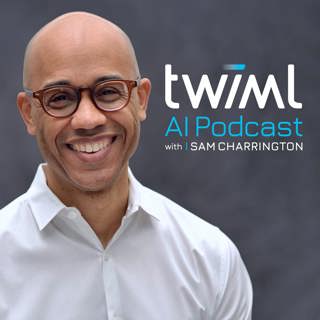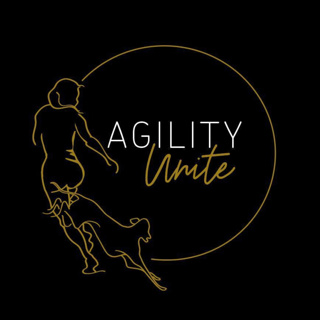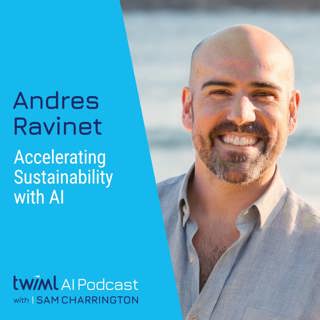
Accelerating Sustainability with AI with Andres Ravinet - #689
Today, we're joined by Andres Ravinet, sustainability global black belt at Microsoft, to discuss the role of AI in sustainability. We explore real-world use cases where AI-driven solutions are leveraged to help tackle environmental and societal challenges, from early warning systems for extreme weather events to reducing food waste along the supply chain to conserving the Amazon rainforest. We cover the major threats that sustainability aims to address, the complexities in standardized sustainability compliance reporting, and the factors driving businesses to take a step toward sustainable practices. Lastly, Andres addresses the ways LLMs and generative AI can be applied towards the challenges of sustainability. The complete show notes for this episode can be found at https://twimlai.com/go/689.
18 Kesä 202447min
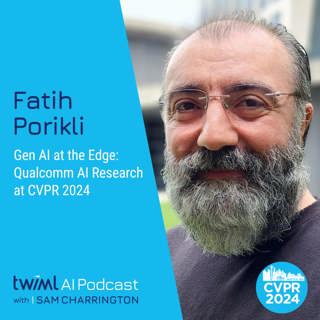
Gen AI at the Edge: Qualcomm AI Research at CVPR 2024 with Fatih Porikli - #688
Today we’re joined by Fatih Porikli, senior director of technology at Qualcomm AI Research. In our conversation, we covered several of the Qualcomm team’s 16 accepted main track and workshop papers at this year’s CVPR conference. The papers span a variety of generative AI and traditional computer vision topics, with an emphasis on increased training and inference efficiency for mobile and edge deployment. We explore efficient diffusion models for text-to-image generation, grounded reasoning in videos using language models, real-time on-device 360° image generation for video portrait relighting, unique video-language model for situated interactions like fitness coaching, and visual reasoning model and benchmark for interpreting complex mathematical plots, and more! We also touched on several of the demos the team will be presenting at the conference, including multi-modal vision-language models (LLaVA) and parameter-efficient fine tuning (LoRA) on mobile phones. The complete show notes for this episode can be found at https://twimlai.com/go/688.
10 Kesä 20241h 10min
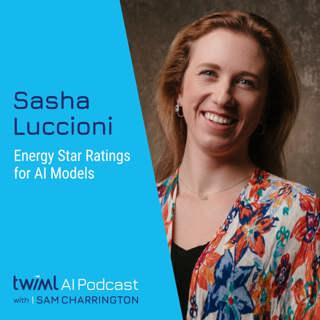
Energy Star Ratings for AI Models with Sasha Luccioni - #687
Today, we're joined by Sasha Luccioni, AI and Climate lead at Hugging Face, to discuss the environmental impact of AI models. We dig into her recent research into the relative energy consumption of general purpose pre-trained models vs. task-specific, non-generative models for common AI tasks. We discuss the implications of the significant difference in efficiency and power consumption between the two types of models. Finally, we explore the complexities of energy efficiency and performance benchmarking, and talk through Sasha’s recent initiative, Energy Star Ratings for AI Models, a rating system designed to help AI users select and deploy models based on their energy efficiency. The complete show notes for this episode can be found at http://twimlai.com/go/687.
3 Kesä 202448min
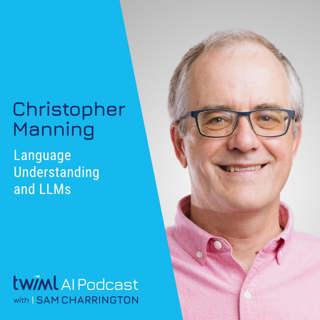
Language Understanding and LLMs with Christopher Manning - #686
Today, we're joined by Christopher Manning, the Thomas M. Siebel professor in Machine Learning at Stanford University and a recent recipient of the 2024 IEEE John von Neumann medal. In our conversation with Chris, we discuss his contributions to foundational research areas in NLP, including word embeddings and attention. We explore his perspectives on the intersection of linguistics and large language models, their ability to learn human language structures, and their potential to teach us about human language acquisition. We also dig into the concept of “intelligence” in language models, as well as the reasoning capabilities of LLMs. Finally, Chris shares his current research interests, alternative architectures he anticipates emerging beyond the LLM, and opportunities ahead in AI research. The complete show notes for this episode can be found at https://twimlai.com/go/686.
27 Touko 202456min
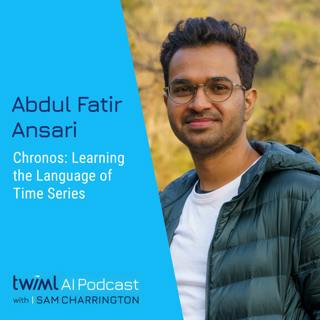
Chronos: Learning the Language of Time Series with Abdul Fatir Ansari - #685
Today we're joined by Abdul Fatir Ansari, a machine learning scientist at AWS AI Labs in Berlin, to discuss his paper, "Chronos: Learning the Language of Time Series." Fatir explains the challenges of leveraging pre-trained language models for time series forecasting. We explore the advantages of Chronos over statistical models, as well as its promising results in zero-shot forecasting benchmarks. Finally, we address critiques of Chronos, the ongoing research to improve synthetic data quality, and the potential for integrating Chronos into production systems. The complete show notes for this episode can be found at twimlai.com/go/685.
20 Touko 202443min
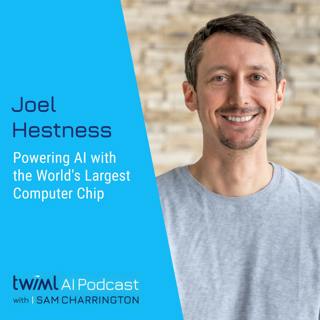
Powering AI with the World's Largest Computer Chip with Joel Hestness - #684
Today we're joined by Joel Hestness, principal research scientist and lead of the core machine learning team at Cerebras. We discuss Cerebras’ custom silicon for machine learning, Wafer Scale Engine 3, and how the latest version of the company’s single-chip platform for ML has evolved to support large language models. Joel shares how WSE3 differs from other AI hardware solutions, such as GPUs, TPUs, and AWS’ Inferentia, and talks through the homogenous design of the WSE chip and its memory architecture. We discuss software support for the platform, including support by open source ML frameworks like Pytorch, and support for different types of transformer-based models. Finally, Joel shares some of the research his team is pursuing to take advantage of the hardware's unique characteristics, including weight-sparse training, optimizers that leverage higher-order statistics, and more. The complete show notes for this episode can be found at twimlai.com/go/684.
13 Touko 202455min
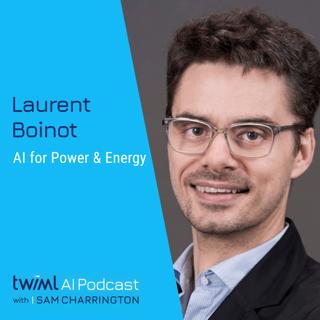
AI for Power & Energy with Laurent Boinot - #683
Today we're joined by Laurent Boinot, power and utilities lead for the Americas at Microsoft, to discuss the intersection of AI and energy infrastructure. We discuss the many challenges faced by current power systems in North America and the role AI is beginning to play in driving efficiencies in areas like demand forecasting and grid optimization. Laurent shares a variety of examples along the way, including some of the ways utility companies are using AI to ensure secure systems, interact with customers, navigate internal knowledge bases, and design electrical transmission systems. We also discuss the future of nuclear power, and why electric vehicles might play a critical role in American energy management. The complete show notes for this episode can be found at twimlai.com/go/683.
7 Touko 202449min
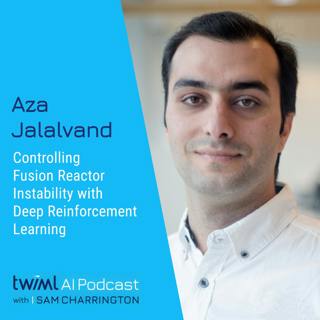
Controlling Fusion Reactor Instability with Deep Reinforcement Learning with Aza Jalalvand - #682
Today we're joined by Azarakhsh (Aza) Jalalvand, a research scholar at Princeton University, to discuss his work using deep reinforcement learning to control plasma instabilities in nuclear fusion reactors. Aza explains his team developed a model to detect and avoid a fatal plasma instability called ‘tearing mode’. Aza walks us through the process of collecting and pre-processing the complex diagnostic data from fusion experiments, training the models, and deploying the controller algorithm on the DIII-D fusion research reactor. He shares insights from developing the controller and discusses the future challenges and opportunities for AI in enabling stable and efficient fusion energy production. The complete show notes for this episode can be found at twimlai.com/go/682.
29 Huhti 202442min
